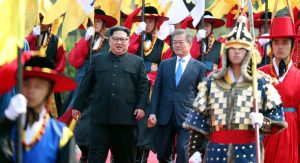North Korea launched a military reconnaissance satellite into orbit late on November 21, violating United Nations Security Council (UNSC) resolutions banning its use of ballistic missile technology. In response, the South Korean government partially suspended the Comprehensive Military Agreement (CMA), with Prime Minister Han Duck-soo stating in the National Security Council meeting that North Korea’s launch was a direct provocation against the security of the South, and that continued adherence to the CMA may put the lives and safety of the Korean public in danger.
The CMA was signed on September 19, 2018, in Pyongyang, as the product of a series of historic meetings between then-South Korean President Moon Jae-in and North Korean leader Kim Jong Un. Under the agreement, Seoul and Pyongyang agreed to “completely cease all hostile acts against each other” by implementing measures that included ending military drills near the border, limiting live-fire exercises, imposing no-fly zones, and maintaining hotlines. It was intended to alleviate military tensions on the peninsula and build mutual confidence. To clarify, North Korea’s latest satellite launch violates UNSC resolutions but not the CMA.
Specifically, the South Korean government suspended article 1, clause 3 of the agreement, which established a no-fly zone for all aircraft types over the Military Demarcation Line (MDL) from November 1, 2018. This clause prohibited fixed-wing aircraft from flying within 40 kilometers of the MDL in the eastern area and 20 kilometers from the western area. Rotary aircraft were prohibited from flying within 10 kilometers of the MDL; unmanned aerial vehicles (UAV) were prohibited within 10 kilometers of the eastern area and 25 kilometers of the western region; balloons were prohibited within 25 kilometers of the MDL.
Critics have long argued that the CMA weakens the South Korean military’s ability to monitor North Korea. Suspending the clause will allow Seoul to resume military surveillance and reconnaissance along the border.
South Korean President Yoon Suk-yeol had already floated the idea of suspending the CMA early this year after North Korea violated the agreement multiple times by conducting artillery fire and flying UAVs over the MDL. Current Defense Minister Shin Won-sik pledged to suspend the CMA during his hearings when he was still a candidate for the post in September this year. Some experts noted that North Korea had not mentioned terminating the agreement even as they nullified its substance through continuous violations, which was interpreted as a bid to pressure South Korea to bring up termination itself and shoulder the blame for intensifying tensions.
Indeed, after the South Korean government announced the partial suspension, North Korea reacted by scrapping the agreement altogether, vowing to fortify military installations at the MDL. Pyongyang has also accused Seoul of breaking the deal, saying it will hold South Korea accountable for potential clashes.
Advocates of the CMA argue that the agreement has in fact alleviated military tensions along the border and that it reduces the risk of military conflict. But the Yoon administration and the conservative ruling party have a track record of pushing for its suspension. Critics in the administration and beyond argue that the agreement existed in name only, as South Korea was the only one upholding it. North Korea violated the CMA 17 times between its signing and the end of 2022.
The South Korean government is expected to review the agreement’s limitations on land and maritime-based military activities as well, depending on North Korea’s subsequent actions.
































